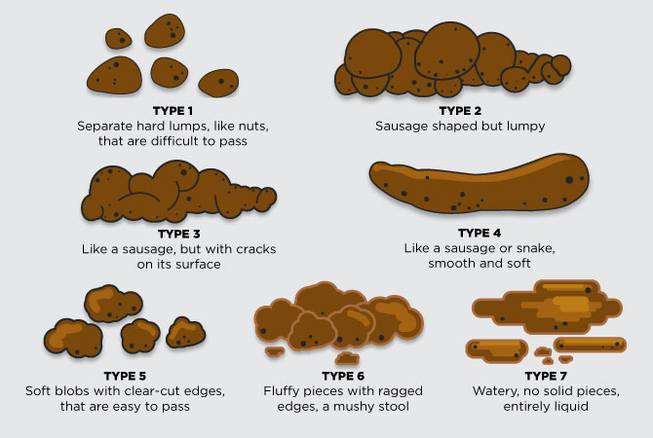
Monday, March 6, 2017 | 2 a.m.
“Bathroom talk” can be an awkward subject to breach, but defecating is a natural process that can indicate a lot about your health.
When you consume food, your body absorbs the nutrients and expels remaining waste as stool. Because of this, your stool can reveal clues as to how well your internal processes are functioning — if you’re digesting food properly, getting enough nutrients, drinking enough water and even if you have a serious disease or condition.
“In general, normal and abnormal is relative when it comes to stool. Any sustained change from an individual’s ‘normal’ is abnormal,” said Stephanie Wishnev, MD, FASCRS, FACS, colon and rectal surgeon at MountainView Hospital. While the topic might make some people squeamish, it’s important to be able to recognize if there’s a problem.
Types of stool
The Bristol Stool Chart, a medical aid used to classify different types of stool, designates seven distinct kinds. While this chart can help evaluate what’s going on inside your body, there are many reasons why someone might pass multiple different stool types throughout a given time period.
“A bowel movement should typically be soft and formed. But the density, frequency, color and consistency of the stool can change based on activity, environment, diet and medications,” Wishnev said.
Type 1: Separate hard lumps, like nuts, that are difficult to pass
Type 2: Sausage shaped but lumpy
Type 3: Like a sausage, but with cracks on its surface
Type 4: Like a sausage or snake, smooth and soft
Type 5: Soft blobs with clear-cut edges, that are easy to pass
Type 6: Fluffy pieces with ragged edges, a mushy stool
Type 7: Watery, no solid pieces, entirely liquid
°°°
Colors of stool
Stool is composed primarily of water, and the rest is fiber, bacteria, cells and other organic material.
Most poop is brown because of a chemical byproduct that is created when the small intestine metabolizes the bile from your liver and gallbladder. If your bowel movements often deviate from a brown color, or if you’re seeing red, white/gray, yellow or black stool, and it happens more than two or three times consecutively, you need to see a doctor immediately.
Here’s what different colors of stool can mean:
• Green: Consumed many green vegetables or green food coloring. Can mean food is being digested too quickly or you’re not eating enough fiber.
• Red: Consumed beets, other dark-colored root vegetables or red food coloring. If it’s consistently red, it could be blood — an indicator of advanced colorectal cancer.
• Yellow: Yellow-ish stool is normal for some, but oily, yellow stool that smells especially bad can mean excess fat is being expelled, possibly caused by celiac disease.
• Light gray: Light-colored/white/gray stool can be caused by some medication, but can also indicate liver or gallbladder disease.
• Black: Can be caused by some medications, but it can also indicate internal bleeding.
°°°
Does it float or sink?
Stools should usually sink slowly, but if they don’t, that’s OK — it’s most likely a sign that you have extra gas in your digestive system caused by diet. However, in rare cases, it can be caused by excess fat being expelled.
How often should I go?
Regularity can vary drastically from person to person. “The normal range of bowel frequency can be three times a day, to three times a week,” Wishnev said. As long as you stay more or less regular on your own schedule, and aren’t experiencing any discomfort, frequency usually isn’t anything to be concerned about.
What should it smell like?
Normal, healthy people have plenty of smelly bowel movements, but if you’ve noticed the smell has been especially bad lately — particularly when paired with diarrhea or other changes — it could signal a problem.
°°°
Colorectal cancer indicators in stool
Signs of colorectal cancer can appear in your stool, but if you’re having bloody stools or pencil-thin stools caused by colorectal cancer, it’s likely that the disease is already in an advanced stage. Because it’s usually symptomless in early stages, it’s especially important to get screened regularly.
“Colorectal cancer is one of the only cancers that we can prevent with screening,” Wishnev said. Everyone should get their first screening by age 50, and people with a genetic predisposition or other risk factors should start sooner, depending on their doctor’s guidance.
Don’t panic, just pay attention
There are many reasons a healthy person might have a few peculiar bowel movements, so don’t assume the worst if you have a couple unnerving bathroom breaks. But do notice if a pattern develops.
“Just about everyone has the occasional episode of diarrhea or constipation, but if a change continues for no apparent reason, it could signal a problem,” Wishnev said.

Join the Discussion:
Check this out for a full explanation of our conversion to the LiveFyre commenting system and instructions on how to sign up for an account.
Full comments policy